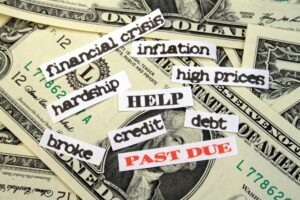Dealing with Financial Hardship

A recent poll found that nearly one out of every five Americans are experiencing financial hardship due to the COVID-19 outbreak and subsequent lockdowns.1 With reported infections soaring in recent weeks, financial stress could affect even more citizens as various areas of the country struggle to contain the pandemic.
However, what may happen in the future matters little to those who are experiencing financial difficulties today. If you’d like guidance on building a sustainable budget or strategies for future retirement income, we can help. It’s important to delay any unnecessary purchases and save any financial windfalls you may receive as long as the economic future remains unclear.
The following is a primer on some of the financial issues you may be facing and what to be aware of as you plan for tomorrow.
Paying Bills
If possible, pause payments on all but essentials, like food, housing and utilities. This means tracking down expenses you may automatically pay on a monthly basis, such as streaming services and subscriptions. If you’re stuck at home, carefully consider what you may need to retain (like Netflix) versus what you do not (gym membership). Also, many utility providers — including phone, internet, auto lenders and insurance — are willing to work with customers to extend payment plans. When in doubt, call. It’s better to discuss options than miss payments and hope for the best.2
Borrowing
Use what resources you have, but try to avoid ratcheting up debt. Some credit card companies offer hardship programs designed to help cardholders through difficult times. According to NerdWallet, 16% of U.S. cardholders applied for hardship assistance in March and April of this year. These programs include options like reduced minimums, deferred payments and/or reduced or waived interest payments. Be aware, however, that entering such a program may result in a negative mark on your credit report. However, this option is better than missing or making late payments.3
Consider other options for borrowing money as well, such as tapping your home equity for a line of credit or refinancing your mortgage.4
Housing
The federal government has enacted a couple of protections for people who can’t pay their rent or mortgage. The first prevents lenders and landowners from foreclosure or eviction — a provision that was recently extended until Aug. 31.5 The Coronavirus Aid, Relief, and Economic Security (CARES) Act includes a provision for homeowners with federally backed mortgages. Homeowners who have experienced financial hardship due to the coronavirus pandemic can request a forbearance for up to 180 days. Forbearance permits the borrower to suspend or reduce mortgage payments for a limited period of time, but it does not forgive amounts owed. Those amounts may be tacked onto future payments or extend the life of the loan.6
Student Loans
The CARES Act also provided a provision to suspend principal and interest payments on federal student loans until September 30, 2020. Be aware, however, that this provision does not apply to older Federal Family Educational Loans not owned by the Department of Education, parent and Perkins loans, and loans issued by state agencies.7 However, these lenders may be willing to work with borrowers who call to request an amended payment plan.
If we can be of any assistance, please contact us at 801-990-5050.
Our firm assists retirees and pre-retirees in the creation of retirement strategies utilizing investment and insurance products. Advisory services offered through B.O.S.S. Retirement Advisors, an SEC Registered Investment Advisory firm. Insurance products and services offered through B.O.S.S. Retirement Solutions. Marketing materials provided by Infinity Marketing Services.
1 Fred Backus and Jennifer De Pinto. CBS News. June 4, 2020. “Nearly one in five say coronavirus has caused financial hardship.” https://www.cbsnews.com/news/coronavirus-pandemic-financial-hardship-cbs-news-poll/. Accessed June 25, 2020.
2 Yuliya Rzad. Consumer Finance Protection Bureau. April 17, 2020. “Tools to help when you can’t pay your bills.” https://www.consumerfinance.gov/about-us/blog/tools-to-help-pay-bills/. Accessed June 25, 2020.
3 Erin El Issa. NerdWallet. June 25, 2020. “2020 Consumer Credit Card Report.” https://www.nerdwallet.com/blog/credit-card-data/consumer-credit-card-trends-study/. Accessed June 25, 220.
4 T. Rowe Price. June 3, 2020. “7 Steps to Take When Facing Financial Hardship.” https://www.troweprice.com/personal-investing/resources/insights/7-steps-to-take-when-facing-financial-hardship.html. Accessed June 25, 2020.
5 Renee Rodriguez. Miami Herald. June 17, 2020. “COVID-19 foreclosure ban for homeowners extended through Aug. 31. But there’s a catch.” https://www.miamiherald.com/news/business/real-estate-news/article243598727.html. Accessed June 25, 2020.
6 Consumer Finance Protection Bureau. April 24, 2020. “Guide to coronavirus mortgage relief options.” https://www.consumerfinance.gov/about-us/blog/guide-coronavirus-mortgage-relief-options/. Accessed June 25, 2020.
7 Sheryl Nance-Nash. Newsday. April 27, 2020. “Money Fix: Lenders offering relief on student loans during pandemic.” https://www.newsday.com/business/coronavirus/coronavirus-student-loans-relief-1.43949927\. Accessed June 25, 2020.
Ready to Take The Next Step?
For more information about any of the products and services listed here, schedule a meeting today or register to attend a seminar.

